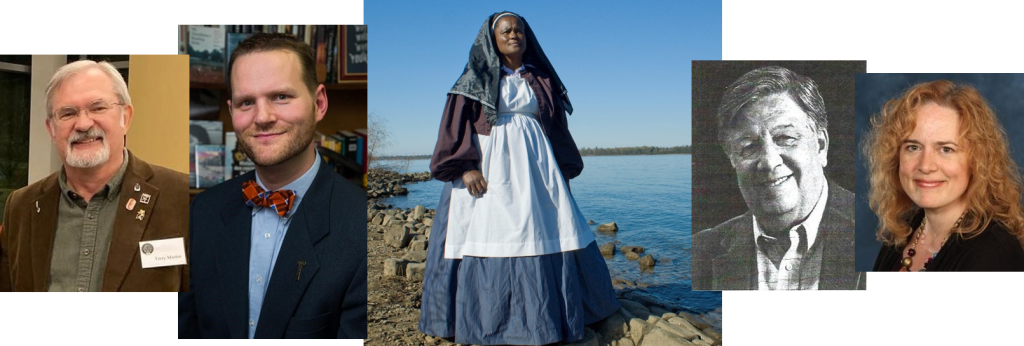June 2021—Likes Lectures offer five freedom stories relating to New Philadelphia
 Every June our Likes Lectures tell freedom stories that relate to New Philadelphia. After last year’s online success, we gather online again this year to hear five stories, the last told in music. 7 pm Tuesdays online. To attend, write to newphiladelphiail@gmail.com for the Zoom details.
Every June our Likes Lectures tell freedom stories that relate to New Philadelphia. After last year’s online success, we gather online again this year to hear five stories, the last told in music. 7 pm Tuesdays online. To attend, write to newphiladelphiail@gmail.com for the Zoom details.
Within a day or so of each event, you will be able to find video and any slides linked here.
June 1: Archaeological Perspectives on New Philadelphia with Terrance J. Martin, Ph.D. From 2002 through 2011, NPA partnered with seven colleges and universities, the Illinois State Museum, the National Science Foundation and several state, and county agencies. We found building foundations, cellars, wells, cisterns, a lime slacking pit and 150,000 artifacts. They tell about families, occupations, regional backgrounds, foodways, and the community’s role in the global economy as well as in our freedom journey. Terrance J. Martin of the Illinois State Museum co-directed all this and will recount highlights. Video | Slides
June 8: Ann Bradford Stokes, Civil War Nurse, with Marlene Rivero. New Philadelphia was part of a network of Illinois freedom activists. African-American Ann Bradford Stokes (1833-1903) worked aboard the Navy’s first hospital ship Red Rover, out of Mound City, Illinois. She occasionally stayed in the Mound City contraband camp which was home to more than 2,000 freedom seekers. On board ship she was cook, laundress, mender, and eventually nurse. Only after the Civil War did she learn to read and write. In a fascinating reenactment, retired U.S. Forest Service interpreter Marlene Rivero will breathe life into Ann Stokes and her story. We thank Illinois Humanities for an Activate History microgrant for this talk. Video
June 15: Did Black Lives Matter in Early Illinois? Voices from the Brink of Slavery and Freedom with Dr. Caroline M. Kisiel. Frank McWorter located his town in geographical crux of freedom and slavery. In 1818, Illinois entered the United States with a Constitution declaring itself a free state, following the guidance of the 1787 Northwest Ordinance, which outlawed slavery north of the Ohio River. But slavery’s roots went back centuries in the region. Some advocated for a permanent constitutional change to allow slavery. Others stood up against them, preserving the free state of Illinois we know. Public historian Caroline M. Kisiel introduces six people who argued one or the other side of this crucial conflict. Video
June 22: New Philadelphia, IL, and Pleasant Ridge, WI: Slavery and Freedom in the Antebellum Midwest with Eugene Tesdahl. Pleasant Ridge was an 1848 settlement of free Black people not too far from a northern site of slavery. The enslaved worked in the lead mines–one mine actually owned by the then-governor. How did free Black families live and work so close to that affront to their safety—and Wisconsin law? How did they relate to enslaved family members back in Virginia? Dr. Tesdahl, professor of history at University of Wisconsin-Platteville, will also compare Pleasant Ridge to New Philadelphia. Video | Slides
June 29: 1820-1920 “Household” Music Making led by William Camphouse with the Pike Pipers and Cleve Curry. New Philadelphia was a music making town, and this program brings us those sounds. The Pike Pipers recorder ensemble and vocalist Cleve Curry will perform popular music that was often live home entertainment. This includes tunes relating to the Civil War, sentimental parlor ballads by Steven Foster, and a stirring patriotic march from the creative pen of someone who lived and composed in New Philadelphia, Hermes Zimmerman. Pike Countian William Camphouse has engaged in music making his whole life, proving that meaningful music is a powerful communicative device for the enlightenment and pleasure of humankind. Video
The Likes Lectures are named to honor surveyors Marvin Likes (shown below) and son Tom who donated so much time and talent to New Philadelphia.
